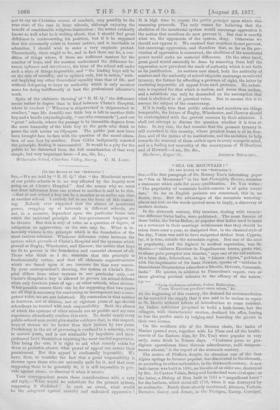MONITORS IN PUBLIC SCHOOLS.
(TO THE EDITOR OF THE "SPECTATOR,"] Sin,—Not the least able part of the able letter of your corre- spondent, " R. H. Q.," on " Monitors in Public Schools " is that in which he sets up a dilemma between " theoretical equality among the boys," which he pronounces a failure, and the monitorial system in large schools. The careful reader will per- ceive that his reasoning applies only to large schools, but all readers are not necessarily careful, and as there is a natural tendency in the human mind to vague generalisation, it may not be out of place to object to an extension of the writer's remarks' beyond the facts contemplated by him. He assumes that "the elder boys will treat the younger ones as inferiors, order them about, and secure the best for themselves, and that when vicious boys indulge in every kind of brutality, no one will feel it his business to call them to order." This unpleasant, not to say un-Christian course of conduct, may possibly be the true state of the case in large schools, although enjoying the benefit of considerable religious instruction ; the writer evidently knows so well what ho is writing about, that I should feel great diffidence in controverting his position, but if it be supposed that this necessarily exists in human nature, and is inevitable in education, I should wish to enter a very emphatic protest. Theoretically, there ought to be, and in fact there can be, a con- dition of things where, if there are sufficient masters for the number of boys, and the masters understand the difference be- tween influence and interference, the tone of the school will make such a state of things impossible, and " the leading boys will bo on the side of morality, not in opinion only, but in action," with- out implying any other theoretical equality than that of life, and without delegating to boys an authority which is only another name for doing indifferently at best the professional educator's work.
Spite of the elaborate showing' of " R. IL Q.," the difference seems rather in degree than in kind between Christ's Hospital, where in conduct (" Whoever is shipwrecked is shipwrecked in conduct," says Mr. Arnold) one little boy is left to another little boy and a beadle (etymologically, " one who commands "), and our " great" schools, where the passage is by insensible degrees from the mere humanity of the little boy to the gods who drink in peace the rich nectar on Olympus. The public just now have been brought face to face with the question of the moral educa- tion of one boy by another. Poor Gibbs indignantly rejected the principle, finding it unsuccessful. It would be a pity for the public to be distracted from the full consideration of that very simple, but very important issue.—I am, Sir, 84c., Witheraden School, Caterhant Miley, Surrey. C. H. LAKE.































 Previous page
Previous page